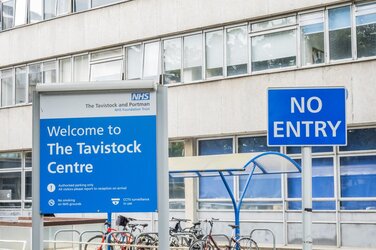Sian Griffiths, Education Editor
Sunday June 04 2023, 12.01am BST, The Sunday Times

Ritchie Herron, 35, who transitioned undertook gender reassignment surgery, no longer identifies as transgender
COLLECT
When Ritchie Herron woke after gender reassignment surgery, he had a feeling he had made a terrible mistake.
Five years later, his scars still sometimes weep and he cannot walk long distances or ride a bike. “I’ve awakened from what was a mental health crisis, to a body that will be for ever changed and damaged,” he said. He no longer identifies as transgender and is living as a gay man “as best I can, given what has happened”.
Now, the Newcastle-based civil servant, 36, has launched legal action against NHS England, alongside the “heartbroken” father of a 21-year-old who has been booked in for imminent genital-removal surgery at an adult gender clinic. The two men are demanding a judicial review which includes an independent inquiry into the safety of NHS treatments being offered to young people under the age of 25 who are experiencing gender dysphoria.

Herron aged 3
COLLECT
Steve Barclay, secretary of state for health, and Kemi Badenoch, minister for equalities, as well as Dr Hilary Cass, who carried out a recent review of the Tavistock Gender Identity Development Service (Gids) are also being served with legal papers. The father is hoping to stop the surgery from going ahead.
In a crowdfunding appeal to raise funds for their legal case, launched today, Herron and the father, who wishes to remain anonymous, say that the model of care for gender dysphoria in the NHS adult service is “profoundly unsafe” and “routinely places young people on a pathway towards irreversible lifelong treatment”.
Both Herron and the father’s 21-year-old child have been diagnosed as autistic. According to lawyers representing the two men, the NHS may be discriminating against autistic people, who are disproportionately more likely to be treated in the gender clinics, which is why Badenoch, as minister for equalities, is included in the legal action.
The case comes as a large number of 17-year-olds who have been on the 8,000-strong waiting list of the Tavistock clinic in north London, England’s only NHS gender identity clinic for children, are being referred to the adult service.

The “last photo” as Ritchie, aged 25
COLLECT
At the seven NHS adult gender clinics in England and Wales, surgery and cross-sex hormones are offered after the age of 18. Patients have at least two assessment appointments with a specialist medical practitioner before hormone treatment is recommended, and those who are considering surgical treatment have two further meetings with separate clinical professionals before they are referred.
There has been a sharp rise in the past decade in young people wanting to change gender. From 2011-12 to 2021-22, the number of under-18s in England referred to the Tavistock soared from 210 to 3,585, according to its own figures.
Herron was 25 when he decided he was a woman living in a man’s body. He had been bullied at school and struggled to cope with his parents’ divorce, and was diagnosed in his early 20s with depression and obsessive-compulsive disorder (OCD).
He decided he was transgender and “all my struggles were due to gender dysphoria” — an idea he says was encouraged by older activists in internet forums. He fixated on the idea that “my body was being poisoned by testosterone”, he says.

As Abby, aged 27
COLLECT
In 2013, he was referred by his GP to an NHS adult gender clinic, and says he was asked early on by an NHS clinician if he had considered gender reassignment surgery. He attended a private clinic as there was a long NHS waiting list, where he was diagnosed as transgender.
When he was seen by the NHS clinic in 2014, they prescribed testosterone blocker and later oestrogen. He also started therapy with an NHS psychosexual counsellor, which lasted for 100 sessions over five years, after which he was told he would be discharged and that the only other treatment open to him was surgery. He had delayed and cancelled the irreversible operation, which involves removing the penis and testicles and modelling the area to resemble female genitalia, several times over the previous two years, fearing the consequences.
In 2017, he was given another referral for surgery, to be performed at a private hospital but paid for by the NHS.
Finally, in 2018, “two days before my 31st birthday, I underwent a surgery that removed my genitals, inverting them in a procedure that has been marked as refined, but is no more civilised than an amputation” he said.
“Today, despite multiple follow-up surgeries, my scar lines still weep, occasionally becoming inflamed and causing crippling pain. In the flesh cavity that was created to mimic a vagina, I feel mostly nothing, aside from the occasional stabs of pain. I can’t use the toilet properly . . . and no matter how hard I push or strain, a dribble emerges, which may continue for hours after I have left the seat.”
The father who, with Herron, is seeking a judicial review of the adult services, says he is terrified of the possible outcome for his child, who was born a boy and who is due to undergo genital surgery shortly. The young person “is on the autistic spectrum, suffers from anxiety and has very poor mental health”, according to the father. The father believes that, like Herron, they think “becoming a woman will solve so many of his problems”.
“I am one of the many parents who is heartbroken over the journey my son has taken,” said the father, who is paying towards the legal fees for the case. “I know he has been let down by the system and fear for his future.”
Aged 13, the boy, who had struggled at school, “out of the blue” told an NHS child mental health adviser that he believed he was a girl. “He was referred to an NHS clinic and was prescribed puberty blocking drugs to halt his development as soon as he turned 16. I was shocked that such an experimental treatment would be given, despite my objections. His anxiety and his autism were not explored.

The Tavistock Gender Identity Development Service has been earmarked for closure, although this has been delayed until March 2024, about a year later than first planned
GUY BELL/SHUTTERSTOCK
“I decided to try to prevent him attending the NHS clinic but was threatened with the possibility of him being taken into care if I stood in his way.
“As a parent, I am deeply concerned to protect my son. I am shut out,” he said. “A system with such limited safeguards, providing a radical experimental treatment with life-long consequences is structurally unfair to people like my son, whose autism makes him more likely to seek the answer to his problems in this radical treatment. He needs more protection, not less.”
The men are being represented by the legal team that helped another de-transitioner, Keira Bell, win a High Court case against Gids to stop children with gender dysphoria being prescribed puberty-blocking drugs. Bell was given the drugs to stop her development aged 16, before later, at an adult clinic, being referred for a double mastectomy. The case was later overturned at the Court of Appeal but led to a critical review of Gids by Dr Hilary Cass. Gids has since been earmarked for closure, although this has been delayed until March 2024, about a year later than first planned.
Herron was not diagnosed with autism until this year, but says he raised the condition with the NHS gender clinic. He adds that if he had received a comprehensive psychological assessment and treatment for conditions such as autism and OCD at the outset, he would never have undergone genital surgery. “I can deal with my own regret, and my own stupidity, but I can’t deal with the fact that I’m not alone in this. That there are not just dozens, or hundreds, but thousands of others like me, and more to come.
“We deserve a safety net, we deserve to be challenged in our beliefs before we make irreversible decisions that have huge lifelong consequences, we deserve to be caught and cared for. We do not deserve to be punished for asking for help, by being castrated and gaslighted into a way of thinking that isn’t our own.
“It is a matter of urgency that the treatment offered by adult services is reviewed and that safeguards are put in place.”
A spokesman for NHS England said: “NHS England has received a pre-action judicial review challenge letter, which we will respond to accordingly.
“The NHS published service specifications for adult gender dysphoria services in 2019 following a three-month public consultation. The final version of the specifications were informed by advice from various UK medical bodies including royal colleges of medicine, health regulatory bodies and NHS Trusts.”
A spokesperson for the Government Equalities Office declined to comment on the case. This year, Badenoch tweeted: “let the tragic Tavistock scandal remind us always to stand up for the truth as we see it . . . no matter how inconvenient or impolite some may find the truth to be.”
